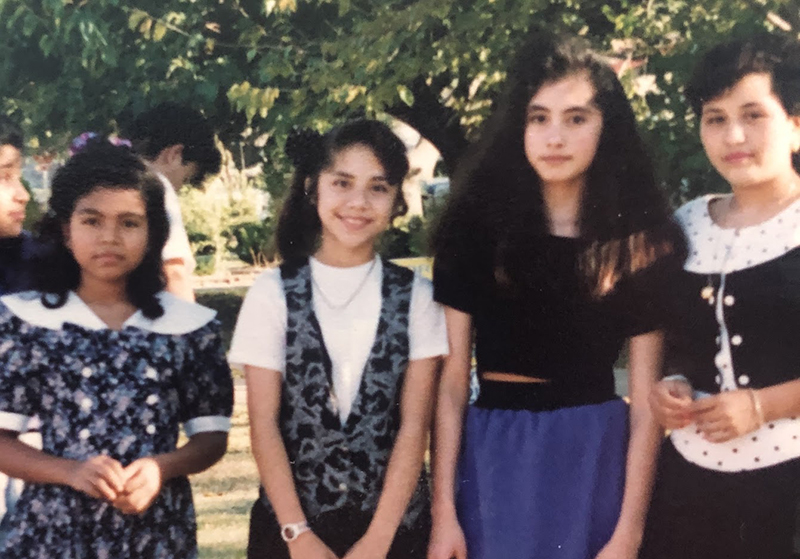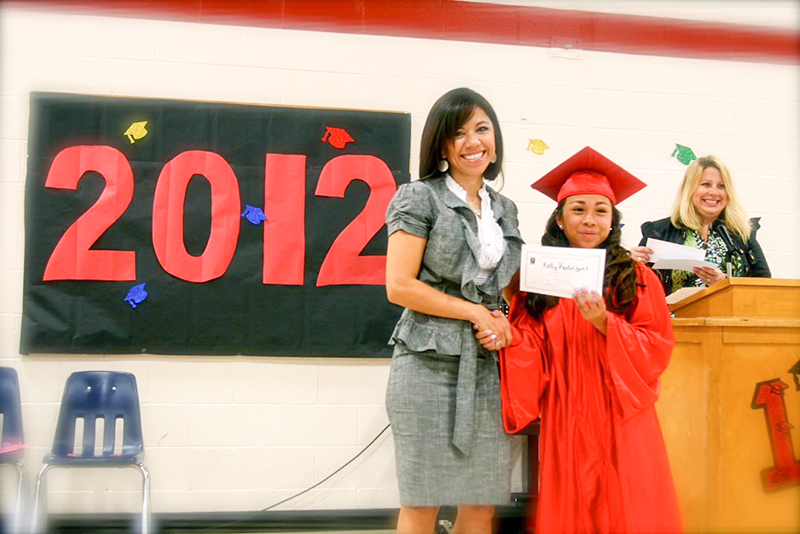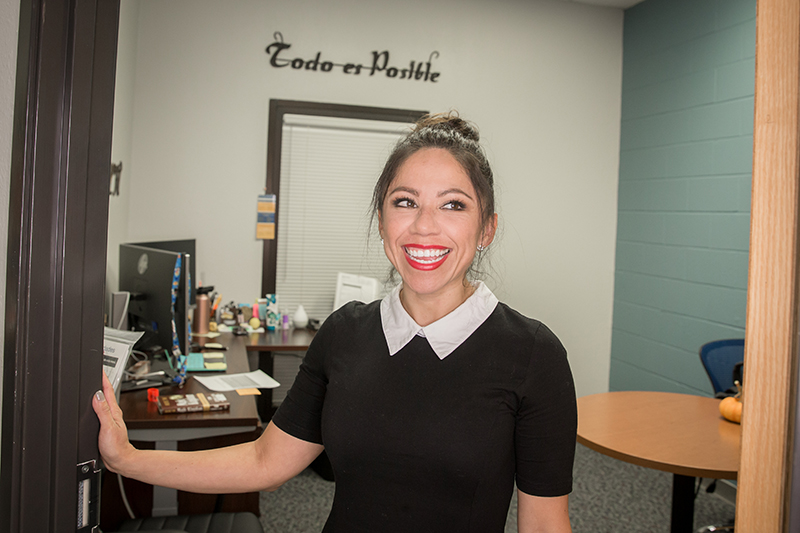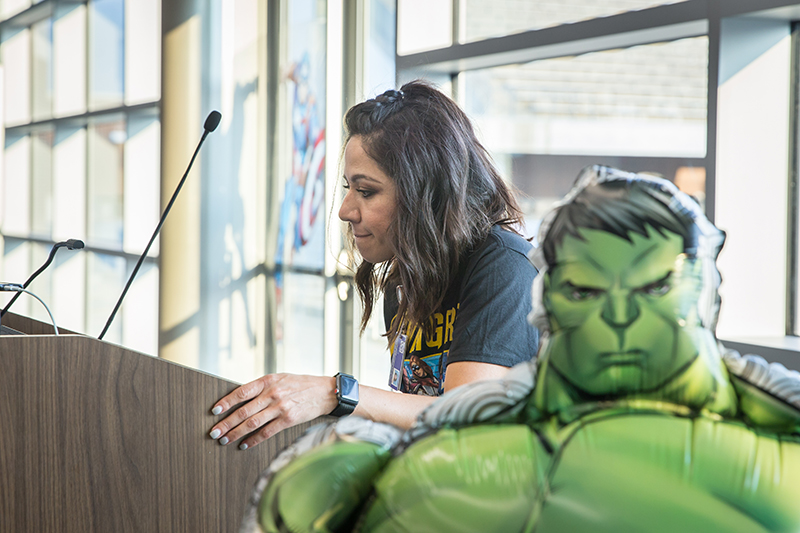MISD Newcomers Program Helps Students from Other Countries Connect and Succeed: Zabdi Gonzalez (Part One of a Three-Part Series)
McKinney, Texas — Thirty years ago, Zabdi Gonzalez stood in the doorway of an American classroom for the first time, searching for her place, poised to begin an entirely new chapter in her life.
It was a promising new start for 10-year-old Zabdi and her family, but the road ahead would not be easy. They had just moved to Texas from Mexico, and Zabdi, who was entering fifth grade, spoke no English.
There were days when Zabdi’s eyes would fill with tears of frustration as she tried to keep up in classes where she couldn’t even understand the words her teachers were saying, much less the content they were teaching.

Zabdi Gonzalez (second from left) in 7th grade, circa 1991, poses for a photo with three other ESL students at her school. Gonzalez, who did not speak English when she came to Texas from Mexico with her family in 1989, went on to become a bilingual teacher, assistant principal and campus principal, and she now leads the MISD English Learner Support Department.
But, each afternoon, the last 30 minutes of the day would finally arrive: English as a Second Language (ESL). During that daily pull out class, Zabdi found a brief respite from the exhausting race to keep up that each day had become. In her ESL class, she found encouragement and hope that she could make it.
And, she was determined to make it…
In 2017, some 28 years later, Gonzalez would stand for the first time in the doorway of her new office deep within the McKinney ISD Administration Building. She had just been hired as the district’s new senior director of English Learner Support, and part of her job would be to oversee the MISD Newcomers Program, to help students succeed who were walking the same road that she had walked.
And, she was determined to help those kids make it.
The MISD Newcomers Program has been in place at Faubion Middle School, McKinney Boyd High School and McKinney High School since 2014 and provides extra support for students who have been in the country for less than two years and who do not speak English. Among the program support structures is a daily elective period that is focused solely on English language acquisition. For the members of that class, it’s a lifeline.
This September, Gonzalez and three of her colleagues from English Learner Support—Jenny Wooters, Nicole Alvarez and Vanessa Vazquez—each spent a day shadowing a newcomer student, traveling with them from class to class to gain a fresh perspective on their needs. What additional support to the teachers and students could they provide to help these students succeed?
That morning, getting ready for the day ahead, Gonzalez was surprised to find that she felt anxious, that the plan to shadow a newcomer at school brought with it memories of the difficult years she spent as a newcomer herself. And, decades later, those memories still evoked trepidation.
But, they also reminded her why she does what she does. Because Gonzalez knows what it’s like to be a child uprooted from the familiar and thrust into a new world with strange ways and a completely different language. She knows what it’s like to be the newcomer.
This is her story.
It’s the first of a three-part series in which we look at the McKinney ISD English Learner Support (ELS) Newcomers Program through the eyes of Zabdi and two MISD students who went through the program, Anita and Nahum.
All three found themselves in Texas at a young age, in classrooms where they did not speak the language, where everyone was (at first) a stranger.
Along the journey, they found opportunity, purpose and belonging.
Zabdi
Culture Shock
“When I came here from Mexico in 1989, we moved to Oak Cliff. Walking in, there were maybe five Hispanic students in the school, and I had never seen people who looked different from me, other than in movies.
“The whole educational system was a culture shock. For a lot of us who came here from schools in Mexico, there had been no indoor buildings like the ones we have here or even things that we take for granted here, like air conditioning. We didn’t have things like that in Mexico.
“As a newcomer, you walk in and you see this whole, big building, and you have no idea what to do. For me growing up in Mexico, a ‘cafeteria’ meant going out to recess and finding a spot to eat outside. There were no chairs or benches to sit on. It was completely different. The gym? A lot of us had never even seen an indoor gym. Back in Mexico, recess meant you went outside, and there were no teachers outside. There was nobody. The classrooms were hot with just open windows and no A/C. Some students had no actual classroom.
“So, when me moved to Oak Cliff, it was all brand new to me. My parents had no familiarity with these things either. So, there was no asking my parents, ‘How do you do this?’ And, honestly, I just figured it out through observing what the other kids were doing.
“I spoke zero English. And they didn’t have a bilingual program like we have here in McKinney; it was pull out ESL. For 30 minutes a day, at the end of the day, they would pull me out—and the small group of ESL kids—and that teacher would help us.
“He was the one. He was my saving grace. He helped me. He didn’t speak Spanish, but he knew strategies, and…he was just kind. Sometimes I wanted to cry because it was so frustrating. It was an overload of language, of material.”

Gonzalez served as principal at Randolph Caldwell Elementary in Garland ISD from 2011–2017. Here, she hands a diploma to her daughter during the school’s 5th grade graduation.
‘You’re so stupid…’
“There was one moment I’ll never forget. It was during fifth grade. In Mexico, I had learned metric units. And, when I moved here, it was pounds. The teacher gave us a worksheet that had an elephant on it, and my language support in the classroom was another student translating for me. On the worksheet, under the elephant, it had the choices of ounces, tons and pounds, and it said, ‘What is the appropriate unit?’ To me it meant nothing because there was no context. I didn’t know what those units of measurement were. So, I chose, ‘Ounces.’
“And, the person who was helping me looked at me, and he said, ‘You’re so stupid.’
“In Mexico, I had gotten honor awards. I was always in the top two at school, but then I came to this new country, and went from ‘I know what I’m doing; I’m smart,’ to being told, ‘You’re so stupid.’ But the teacher didn’t know better. Things like that, they didn’t think about in 1989.
“The teacher would have me read out loud during the read aloud. I didn’t know how to pronounce those words. I didn’t know the alphabet. I had no idea.
“And, it was almost like the other kids felt sorry for me. I was like the little class pet. Most of the students were bigger. So, they were almost like, ‘Oh, you poor little Mexican girl.’ (Laughs) They were nice about it. They would do what they could, but I don’t know if I could say they were really my friends because I couldn’t understand.”
“One of my siblings was supposed to go to high school, but because of his young age they moved him down to middle school. Now that I’m in education, I realize that is so inappropriate. You don’t put somebody back. He had the grades, and he was passing, and they put him back in middle school. My other siblings were already age appropriate for high school, but they had to work and help at home, so they didn’t go to school that year. So, it was just my other brother and I. My other brothers worked.
“So when I visit the newcomer program at our high schools, that’s what I think about. I think of my brothers and what they went through. There’s a whole emotional piece that people don’t realize that’s involved in all this.”

McKinney ISD Senior Director of English Learner Support Zabdi Gonzalez shares a laugh with one of her coordinators.
Sink or Swim
“When I came to Texas, a lot of learning English was done on my own. My fifth grade ESL teacher helped me a lot, but learning English was mostly memorization, and that just helped me survive and helped me with my work.
“I moved to Garland in 6th grade. I had one ESL class, and everything else was just general education classes. So, a lot of it was just figuring out, translating, paying attention and that was it. Back then in the late 80’s and early 90’s, the teachers just did a lot of worksheets. So, obviously, it was just get the grade, pass and that’s it.
“When I reached high school, I still didn’t feel confident with English. Even in college, public speaking was always hard. I thought that people would assume that I didn’t know the content because of my accent, that they would associate that with my level of intelligence.
“I’ve blocked out a lot of things, to be honest, because it was so hard. I was just trying to get through.
“When I came to the United States, and there was no bilingual support, there was a seed planted: ‘When I get older, I want to be a bilingual teacher.’ Because I wanted to help kids like me, so they don’t have that same experience, that whole sink or swim thing. So, that’s what started it.
“In high school, I did the teacher program where you would get to go to the elementary schools and help in the classroom. I thought, ‘Ok, I like this. I can do this.’ But, our counselors kind of just dismissed me. They didn’t say, ‘Hey, you can do honors classes.’ Looking back, that was not an option. Nobody talked to me about scholarships, about honors classes, nothing.”

Gonzalez reviews her notes before a superhero-themed professional development session with district administrators in August.
Purpose
“So, I went to community college, and I was working full time, paying my own way, and one of the professors told me about an opportunity for Texas Woman’s University, and it was for teaching. He said, ‘They’re giving scholarships. What do you think about it?’
“I still had that seed of, ‘I want to help others,’ so I decided to check it out. I went to TWU, applied and got a scholarship for the next two years. I graduated from there, and I had the bilingual certificate. When I interviewed in Garland, I interviewed at three campuses. Two of them offered me a job. But, one of them was predominantly Hispanic, very low SES. And, I thought, ‘Wow, this is the reason I started this process.’
“And I stayed there.
“At that school, I was a teacher, then an assistant principal and then principal—until I came to McKinney in 2017. I was there 15 years. I think this is my 20th year in education.
“A lot of what we do in English Learner Support, and with the Newcomers Program specifically, is about breaking the cycle of what it looks like to be one of those students. A lot of these kids come for a better opportunity. Sometimes their parents don’t necessarily know what the possibilities are because they didn’t have that opportunity themselves.
“So, it’s breaking the cycle of thinking that all you can do or all you can amount to is just to go to work after you graduate. It’s giving them the opportunity that’s really what they came here for and helping them discover their potential.
“I’ll be honest, a lot of people in high school, middle school…people dismissed me because I didn’t know the language at their level. So, when I became a principal, I brought my dad in and I thanked him, but I also told my staff that the reason that I’m here, and the reason I believe in what we’re doing is because when I was a newcomer people dismissed me.
“The whole point of us helping kids who are like we were is so they can be whatever they want to be. When you get a newcomer, you can’t dismiss their potential. You can’t just say, ‘Oh, they’re from so and so; they’re from some other country…’ because they have the potential to succeed.
“Our job is to give them the language and help them discover that potential.”
Need Help?
If you need additional assistance with the content on this page, please contact MISD Communications Department team member Shane Mauldin by phone at 469-302-4007 or by email here .